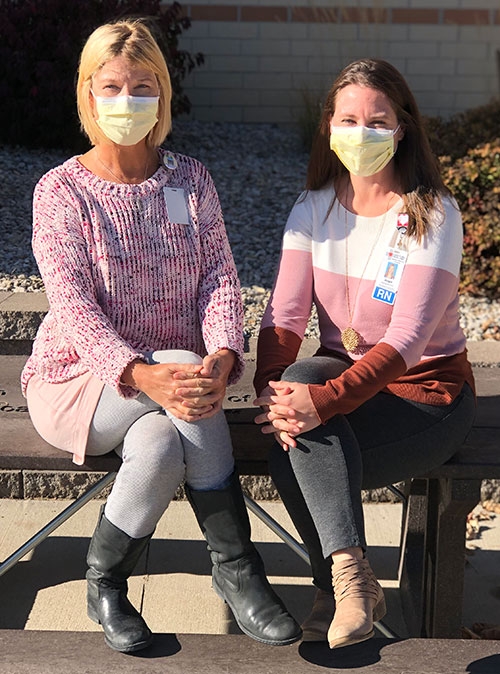You are here
Home ›Diabetes Education remains essential; November observed as National Diabetes Awareness Month

Diabetes Education Team at VMH ... November is National Diabetes Awareness Month. Pictured above is the Veterans Memorial Hospital Diabetes Education Team, left to right, Jill Fleming, Dietitian, and Angie Mettille, RN, Certified Diabetes Educator. Submitted photo.
by Angie Mettille RN, Certified Diabetes Educator, Program Coordinator
November is National Diabetes Awareness Month. Diabetes is a disease full of challenges. Every day presents decisions that need to be made and sometimes problems that need to be solved. What should I eat for breakfast? How many carbohydrates are in that bowl of soup? How will that banana affect my blood sugar? Did I take my insulin this morning? My blood sugar is higher than normal, what do I do? I’m worried about my risk of heart disease and stroke because my A1c has been higher than my doctor likes, how can I decrease my chance of complications? How am I going to pay for my insulin this month?
The COVID-19 pandemic sure hasn’t made managing diabetes any easier. Appointments have been pushed back and maybe diabetes education appointments have become less important and deemed non-essential. We all know that diabetes doesn’t “go away” or “take a break” during a pandemic. We’ve all had to change our routines and lives to stay safe and healthy.
Many days, all of this may seem overwhelming. Diabetes is a disease that can cause stress in your life, and during a pandemic, this has likely increased significantly. Having a diabetes educator on your team can help ease many of these common worries, and appointments can continue to be done safely.
A diabetes educator can help you develop a plan to stay healthy and give you the tools you need to navigate the various curveballs that diabetes can throw at you. One thing is sure - the more support you have, the more successful you can be. It is often said, it takes a village to raise a child. This is also true for diabetes; it takes a village to control diabetes. That village, or healthcare team, consists of your physician, your physician’s nurses, a nurse diabetes educator, dietitian, and pharmacist just to name a few. It’s likely when you have diabetes, you are taking medications, so you are likely to see your physician and his or her nurses on a regular basis to get labs completed and your necessary medications ordered. You are likely to run into your pharmacist when you pick up those medications.
But what about your diabetes educators? When is it a good time to see your nurse diabetes educator and dietitian? Do you have to wait until your blood sugars are out of control? The answer is no. Diabetes education should be a part of your yearly, or more often if needed, routine. The best time for diabetes education is:
1. When you’re first diagnosed with diabetes.
2. Annually to review your treatment plan and make improvements as needed.
3. Whenever complications arise such as vision changes, cardiac disease or stroke, kidney disease, neuropathy, persistent infections or wounds that are not healing as they should.
4. During changes in your healthcare treatment, such as medication changes or major life events that affect how you manage diabetes - physically, socially, mentally or financially. Whatever problem is causing your blood sugars to be too low or too high, your diabetes educators can help you design a specific plan that will work for you and your life.
Measures are taken every day at Veterans Memorial Hospital to ensure patients are safe within the facility. Within diabetes education, patient appointments are spaced appropriately to ensure time for disinfecting the meeting space between patients. Masks are required, and a face shield will be worn by your diabetes educator. High traffic areas throughout the hospital are avoided to minimize contact with extra personnel, and hand sanitizer is readily available. If a face to face visit still makes anyone uncomfortable, telehealth consults are available.
Veterans Memorial Hospital Diabetes Educators look forward to working with those living with Type 1 Diabetes, Type 2 Diabetes, or Gestational Diabetes. Continuous glucose monitoring is also available, which is extremely helpful with making insulin and medication adjustments to help attain A1c and blood sugar goals.
The Veterans Memorial Hospital Diabetes Self Management program is accredited by the ADCES (Association of Diabetes Care and Education Specialists, formerly the AADE), and recently completed a successful random audit. All criteria and requirements of CMS (Center for Medicare and Medicaid Services) were met, scoring 100%. By maintaining this accreditation, appointments that are deemed medically necessary are covered by Medicare, Medicaid, and commercial insurance plans. Deductibles and co pays may still apply, depending on the individual’s personal plan.
For more information, contact the Diabetes Education Department at Veterans Memorial Hospital at 563-568-3411 ext. 172.

